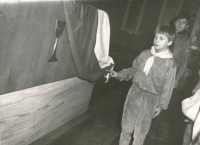I have been a parson for over thirty years, yet sometimes I do not understand the Bible

Download image
Zdeněk Šorm, an evangelical pastor and artist, was born on 1 October 1959 in Prague. He grew up near the forest in the Hodkovičky district of Prague with four brothers, a mother, a father, a grandmother, and a grandfather. Father Zdar Šorm was expelled from the Faculty of Arts in 1948 for his faith and political activity with the National Socialists. At the secondary technical school, where Zdeněk Šorm studied the design of toys and puppets, he became acquainted with alternative culture, founded his band Soubor Dalibor, and held musical performances on the school steps - for example, by Jaroslav Hutka. The normalization of the church, which distanced itself from politics and public life, led him to the Zbytov estate. In the second half of the 1970s, it was an important center for parish priests without permission to operate. There he met pastors Jan Keller and Vojan Syrovátka, who became crucial figures in his life. In 1985, he completed his studies in evangelical theology. And most likely because of his ties to the Lipštát district, the so-called “dissenters”, he did not receive state approval to perform clerical work. In December 1985, he married Ruth Eisler, a signatory of Charter 77 and later a member of the Federal Assembly. At the military service in Kostelec nad Labem, he refused to vote and was eventually forced to vote. After the military service, he came to Soběslav through České Budějovice, where he worked from 1988 to 2005 as senior vicar, vicar and subsequently as parish priest. He participated in the organization of events and gatherings of the Velvet Revolution. He was active in municipal politics. In the 1990s, he was the editor-in-chief of the magazine Cesty víry. He and his wife adopted three children. In 2019, he published a book of illustrations, Nakresli mi Bibli... (Draw my Bible...). At the time of filming in 2022, he lived in Prague and worked as a priest in Vinohrady.


















